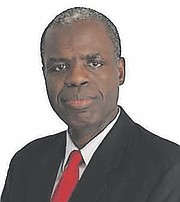By YOURI KEMP
Tribune Business Reporter
ykemp@tribunemedia.net
The Central Bank’s governor yesterday said Bahamas residents were in line to receive 50 percent of the more than $1bn in reinsurance settlement inflows to cover Hurricane Dorian losses.
John Rolle told the Bahamas Business Outlook conference: “Collectively, it is estimated that more than $1bn in such settlements will cover Dorian’s losses - the highest amounts ever received. The portion of inflows to local residents will exceed $500m. A healthy level of receipts will also help non-residents finance their rebuilding.”
Speaking on what the Central Bank is doing to ensure commercial banks and financial institutions have adequate access to foreign currency, Mr Rolle added: “For the Central Bank, our capacity to either stimulate the recovery or to give the lending institutions the scope to do so also depends on whether the external reserves, in combination with other access to foreign exchange, are able to finance imports of goods and services needed for a recovery.
“The Central Bank has to satisfy this outcome while preserving the Bahamian dollar fixed exchange rate regime. This task always presents itself coincidental to a pause or slowdown in foreign exchange inflows from tourism activity.”
Mr Rolle explained that the “buffer or access to foreign exchange during shocks” was derived from three sources. “The first is the outcome of our deliberate efforts to accumulate foreign reserves in non-crisis periods”, while the “second means is through government borrowing for reconstruction. As public finances improve or get to a healthier state, it creates the necessary space to borrow or draw on external other financial arrangements in times of emergencies”. The third is reinsurance inflows from the international market.
The Central Bank governor said 1,200 wallets were now operational in Exuma as part of Project Sand Dollar, the launch of the digital Bahamian dollar, with another 2,000 participants seeking to join. He said the initiative “has the potential to deliver on a longer-term resilient and deployable framework for financial access”.
“Payments services connectivity can be swiftly restored in a wireless fashion after disasters, avoiding the cash shipment and cash handling frustrations,” he explained. “If necessary, aid could be dispensed electronically, and families allowed to recapture their personal dignity, with flexibility to prioritise the elements of personal needs that they must satisfy post-disaster.”
Some seven payments service providers are participating in rolling out the Sand Dollar app, ranging from money transfer agents to at least one commercial bank and other payment service providers.
However, Mr Rolle defended the Central Bank’s policy of imposing a moratorium on the number of licensed payments service providers in The Bahamas as a way to protect the market’s integrity and its over-saturation to the point where no operator makes a profit.
Two applications were left in limbo, but Mr Rolle said: “You are not going to get multi-million dollar rich by providing certain services in The Bahamas. In financial services, that is one of the areas where you don’t want to manage the fall-out consequences of business failures the same way you would manage it in other places.”
“Eventually when we start to roll out financial technology, we are going to have to appreciate that payments is just one of the elements and there are a lot of other drivers and propositions we need to be thinking about.”





Comments
moncurcool 6 years, 1 month ago
$500 million really going to residents? Seriously? The majority of that is going to business, and not residents, and the majority of residents were not insured. But there again, people like to spew whatever comes to their mouths to try make things look better than it really is.
bogart 6 years, 1 month ago
The Head of the Central Bank is making these statements that are picked up and the world and nation is guided by. These statements are to give comfort and instill confidence for all.
@moncurcool, yes you, we and public and international community all know that the majority of businesses, islands with high unemployment etc, barely hanging on in affected disaster islands were almost mortgaged to banks and other financial institutions and at the bottom of the insurance policy is the bank or lending listed as "Loss Payee".
Added to events that repeated flooded areas are likely to be restricted going forward without being rebuilt so we have to listen to the leading Governor of the Bahamas Central Bank no whatever he says. Lol.
Sign in to comment
OpenID